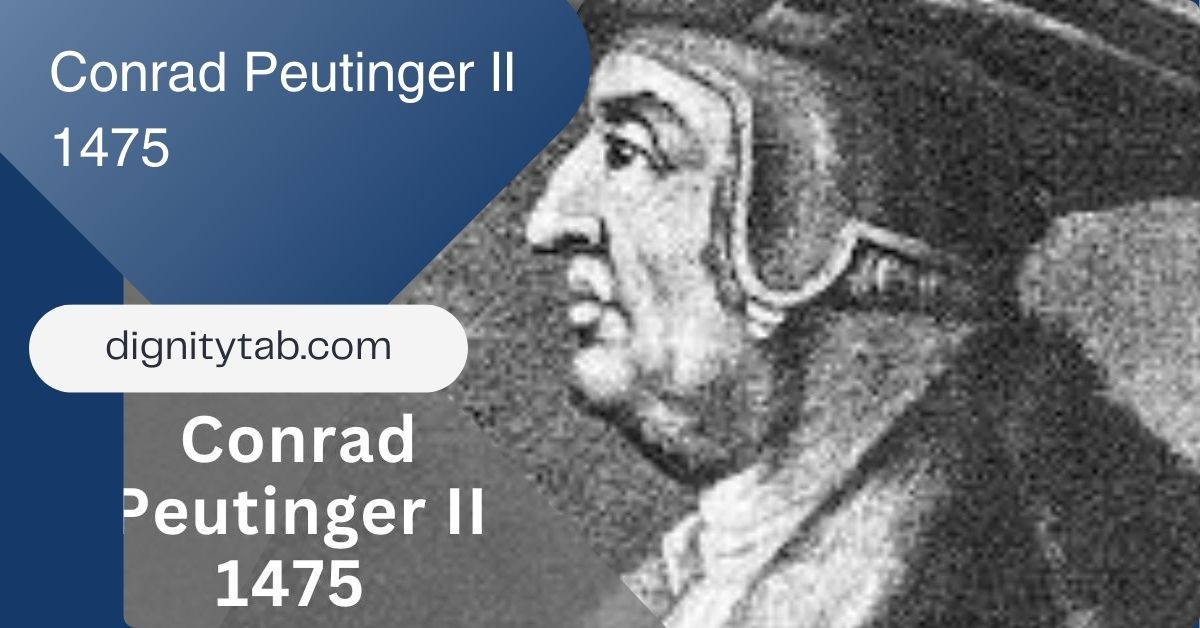In the vibrant tapestry of Renaissance Europe, few figures shine as brightly as Conrad Peutinger II, born in 1475. This remarkable scholar, diplomat, and antiquarian left an indelible mark on history, bridging the gap between ancient wisdom and the burgeoning intellectual curiosity of his time. Today, we embark on a journey to uncover the life, achievements, and lasting impact of this extraordinary individual.
Early Life and Education
A Promising Start in Augsburg
Conrad Peutinger II was born in 1475 in the bustling German city of Augsburg. This thriving center of commerce and culture would prove to be the perfect backdrop for young Conrad’s intellectual growth. From an early age, he showed a keen interest in learning, devouring books on history, law, and classical literature.
A Thirst for Knowledge
As a child, Conrad’s parents recognized his exceptional abilities and ensured he received the best education possible. He attended local schools in Augsburg, where his teachers quickly noted his sharp mind and insatiable curiosity. These early years laid the foundation for his future success as a scholar and humanist.
University Years and Intellectual Growth
Italian Adventures
In 1493, at the age of 18, Conrad embarked on a life-changing journey to Italy. He enrolled at the prestigious University of Padua, known for its excellent law program and vibrant intellectual atmosphere. Here, Conrad immersed himself in the study of Roman law, classical languages, and ancient history.
Encounters with Great Minds
During his time in Italy, Conrad had the opportunity to meet and learn from some of the greatest scholars of the day. He attended lectures by renowned humanists, engaged in lively debates with fellow students, and began to build a network of intellectual connections that would serve him well throughout his career.
Return to Augsburg and Rise to Prominence
A Homecoming of Promise
In 1497, Conrad returned to Augsburg, armed with a wealth of knowledge and a burning passion for scholarship. His reputation as a brilliant young mind preceded him, and he quickly found himself in high demand among the city’s elite.
Legal Career and Civic Duties
Conrad’s expertise in Roman law made him a valuable asset to Augsburg’s government. He was appointed as the city’s syndic, a position that combined legal counsel with diplomatic responsibilities. In this role, Conrad demonstrated not only his intellectual prowess but also his practical skills in negotiation and statecraft.
The Humanist Scholar
A Champion of Classical Learning
Throughout his life, Conrad Peutinger II 1475 remained dedicated to the ideals of Renaissance humanism. He believed in the power of ancient wisdom to inform and improve contemporary society. This passion drove him to collect and study classical texts, manuscripts, and artifacts with unmatched enthusiasm.
The Peutinger Library
One of Conrad’s most significant contributions to scholarship was the creation of his personal library. Over the years, he amassed an impressive collection of books, manuscripts, and rare documents. This library became a treasure trove for scholars from across Europe, who sought access to its wealth of knowledge.
The Tabula Peutingeriana
A Map That Changed History
Perhaps Conrad Peutinger II’s most famous association is with the Tabula Peutingeriana, an ancient Roman map that bears his name. Although Conrad did not create the map, he played a crucial role in its preservation and study.
Discovery and Preservation
The story of how the Tabula Peutingeriana came into Conrad’s possession is a fascinating one. In 1507, his friend Konrad Celtes discovered the map in a monastery library and entrusted it to Conrad for safekeeping and study. Recognizing its immense historical value, Conrad took on the responsibility with great care and dedication.
Unlocking Ancient Secrets
Conrad spent years studying the Tabula Peutingeriana, working to decipher its contents and understand its significance. His meticulous analysis helped reveal valuable information about the Roman Empire’s road network, trade routes, and geographical knowledge.
Diplomatic Career and Imperial Connections
Advisor to Emperors
Conrad’s reputation as a scholar and legal expert did not go unnoticed by the highest echelons of power. He served as an advisor to Holy Roman Emperors Maximilian I and Charles V, providing valuable counsel on matters of law, diplomacy, and history.
Nurturing Imperial Ambitions
In his role as imperial advisor, Conrad helped shape policies that would have far-reaching consequences for Europe. He advocated for a strong, centralized empire based on Roman precedents, using his deep knowledge of classical history to support his arguments.
Literary Works and Scholarly Contributions
A Prolific Writer
Throughout his life, Conrad Peutinger II 1475 produced numerous written works on a wide range of subjects. His writings covered topics such as Roman antiquities, German history, and contemporary politics. While many of these works have been lost to time, those that survive provide valuable insights into his thoughts and the intellectual climate of the Renaissance.
Sermones convivales
One of Conrad’s most notable works is the “Sermones convivales” (Table Talk), a collection of essays and dialogues on various subjects. This work showcases his broad knowledge and engaging writing style, covering topics from ancient history to current events.
Legacy and Influence
A Bridge Between Worlds
Conrad Peutinger II’s greatest achievement was perhaps his role as a bridge between the ancient world and the Renaissance. By preserving, studying, and sharing classical knowledge, he helped fuel the intellectual revolution that was transforming Europe.
Inspiring Future Generations
Conrad’s work inspired countless scholars who came after him. His methods of historical research, his dedication to preserving ancient texts, and his interdisciplinary approach to learning set a new standard for academic inquiry.
The Peutinger Circle
Even after his death, Conrad’s influence continued through the “Peutinger Circle,” a group of scholars and humanists who carried on his legacy of learning and intellectual exchange. This network of thinkers helped disseminate new ideas and preserve valuable knowledge for future generations.
Conrad Peutinger II 1475 in Modern Memory
Rediscovering a Renaissance Giant
In recent years, there has been a renewed interest in Conrad Peutinger II and his contributions to Renaissance scholarship. Historians and academics are re-examining his works, uncovering new insights into his life and times.
Digital Preservation
Modern technology has allowed for the digitization and wider dissemination of Conrad’s surviving works, including the famous Tabula Peutingeriana. This has made his contributions more accessible to scholars and history enthusiasts around the world.
Conclusion
Conrad Peutinger II, born in 1475, was a true Renaissance man whose impact on scholarship, diplomacy, and the preservation of classical knowledge cannot be overstated. His life’s work bridged the gap between ancient wisdom and the intellectual fervor of the Renaissance, laying the groundwork for generations of scholars to come.
As we reflect on Conrad’s legacy, we are reminded of the power of curiosity, the importance of preserving our cultural heritage, and the enduring value of interdisciplinary learning. In many ways, the spirit of Conrad Peutinger II 1475 lives on in the academic pursuits and intellectual exchanges of our own time.
FAQs about the Conrad Peutinger II 1475
Who was Conrad Peutinger II 1475?
Conrad Peutinger II was a German Renaissance humanist, scholar, and diplomat born in 1475 in Augsburg. He is known for his contributions to classical studies, legal expertise, and association with the Tabula Peutingeriana.
What is the Tabula Peutingeriana?
The Tabula Peutingeriana is an ancient Roman map depicting the road network of the Empire. While not created by Conrad Peutinger II 1475, it was preserved and studied by him, leading to its association with his name.
What were Conrad Peutinger II’s main areas of study?
Conrad Peutinger II focused on Roman law, classical literature, ancient history, and antiquities. He was also involved in contemporary politics and diplomacy.
How did Conrad Peutinger II 1475 contribute to Renaissance scholarship?
He collected and preserved ancient texts, studied Roman artifacts, wrote scholarly works, and created a vast personal library that became a valuable resource for other scholars.
Did Conrad Peutinger II 1475 have any connection to royalty?
Yes, he served as an advisor to Holy Roman Emperors Maximilian I and Charles V, providing counsel on legal and historical matters.
What is the “Peutinger Circle”?
The Peutinger Circle was a group of scholars and humanists who continued Conrad’s legacy of learning and intellectual exchange after his death.
How has modern technology impacted the study of Conrad Peutinger II’s work?
Digital preservation efforts have made his surviving works, including the Tabula Peutingeriana, more accessible to scholars and the public worldwide.
What was Conrad Peutinger II’s most famous written work?
While many of his writings have been lost, his “Sermones convivales” (Table Talk) is one of the most well-known surviving works, showcasing his broad knowledge on various subjects.
How did Conrad Peutinger II’s education in Italy shape his career?
His studies at the University of Padua exposed him to advanced legal education and humanist thinking, which greatly influenced his later work and intellectual pursuits.
What is Conrad Peutinger II’s lasting legacy?
His legacy lies in his role as a bridge between ancient knowledge and Renaissance thinking, his preservation of classical texts, and his influence on future generations of scholars and humanists.



